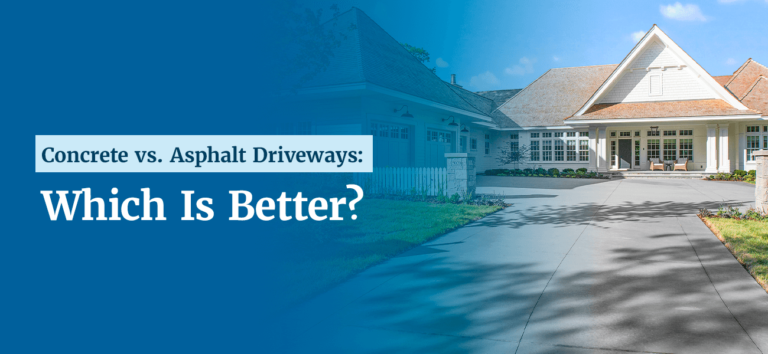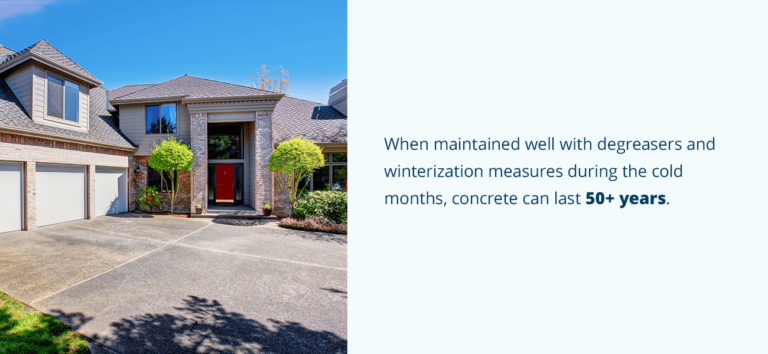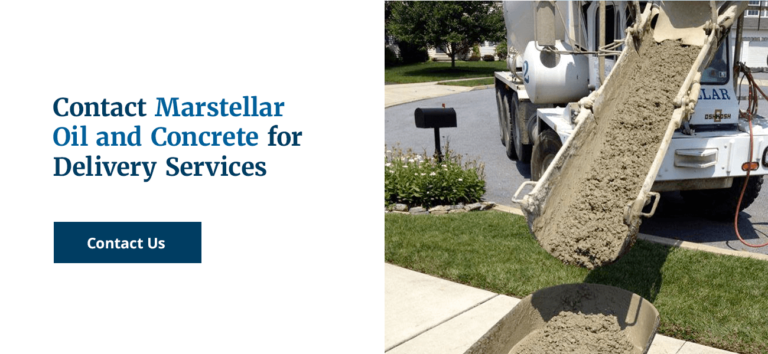
If you’re thinking of upgrading your existing driveway or you’ve moved into a new house and want to install one, you’ll need to consider multiple factors before making your decision. One of those is the materials you’ll use. Your chosen materials will significantly affect your driveway’s costs, maintenance, durability, longevity and more. For those reasons, aim for an option that will provide you with all the benefits you’re looking for and then some.
Concrete and asphalt are common materials for residential driveways, but it can take some time to figure out which one is better if you’ve never had a new driveway installed before. We’ll help you learn more about the benefits and considerations of each of these materials in this article.
Concrete vs. Asphalt Driveway Costs
When installing a concrete or asphalt driveway, costs are determined based on square footage. Concrete has a higher price per square foot than asphalt, which can make it more expensive to install. Despite the higher upfront cost, concrete offers lower maintenance expenses over the course of its life span, which we’ll explore in more detail below.
Asphalt generally costs less per square foot compared to concrete, but asphalt prices can fluctuate depending on crude oil prices, as this material is a byproduct of crude oil. You may also see higher expenses in the form of more frequent upkeep and repairs. If you’re trying to stay within a certain budgetary range, this point is essential to keep in mind when considering asphalt.
The cost of your new driveway installation will also depend on factors like the driveway’s size, the complexity of the job, material availability and other components you may decide to add, like a drainage system.
Maintaining a Concrete vs. Paved Driveway
Concrete has fewer maintenance needs than asphalt — and lower upkeep costs. If you install a concrete driveway, you can seal it about a month after installation to help preserve its looks and durability. It won’t need much more maintenance than this other than general cleaning. However, do keep in mind that concrete stains more easily than asphalt, meaning you’ll need to use a degreaser on your driveway as oil and other stains build up over time.
In contrast, asphalt driveways need more frequent sealing and resurfacing of cracks. You’ll need to address any cracks, ruts or other issues with your asphalt driveway before resealing it, which can extend the entire process and cost you more money. One upside is that asphalt repairs can be a fairly straightforward DIY job, so you don’t necessarily need to enlist a professional if you can complete the task yourself.
Both types of materials can suffer from cracks that will need repairs, though asphalt is more susceptible because of its softer consistency. Asphalt cracks are generally easier to fix than splits in concrete, and the patched sections blend in more smoothly with the rest of the material.
Concrete cracks can also need repairing, though they are more difficult to fix. For example, you cannot seamlessly resurface individual cracked sections unless you do the entire driveway. Concrete repairs are also more complex, so you may benefit more from hiring a professional if you don’t have prior experience working on concrete.
Durability of Concrete vs. Asphalt
When maintained well with degreasers and winterization measures during the cold months, concrete can last 50+ years — more than enough time for you to enjoy your concrete driveway and get full use of it. If you desire a reliable and consistent solution for your home, concrete can fit the bill.
Concerning concrete vs. asphalt in cold climates, concrete doesn’t hold up as well, but this point does have a caveat. The freeze-thaw process can create large cracks in the material, which can become even bigger over subsequent freezing periods. Water accumulates within the porous concrete, freezes, expands and creates cracks when it exceeds the amount of pressure the material can handle.
However, if you live in a cold climate that remains below freezing throughout the winter, you’ll experience fewer freeze-thaw cycles and may see less concrete damage. Winterizing your driveway can also give it some resilience during the cold months — sealing your concrete makes it less porous and less susceptible to absorbing moisture.
Similarly, asphalt doesn’t fare well in hot climates — the heat can soften it to the point of cracking or warping. It could even become sticky on your car tires or shoes in especially hot temperatures.

Overview of Concrete Driveways and Asphalt Pavement
If you’re still undecided about which material might be best for your new driveway, below is a quick rundown of concrete and asphalt and all their advantages and considerations.
Concrete
Some main benefits of a having concrete driveway include:
- A long life span and high strength
- Less maintenance over the material’s lifetime
- Lower maintenance expenses
- More design options, such as concrete brushing, tinting or stamping
On the other hand, here are some points to keep in mind when weighing your options with concrete:
- Cracks more easily in cold climates
- Is generally more costly than asphalt
- Is generally not suited for DIY repairs
- Stains easily due to its lighter color
Asphalt
Pros of installing an asphalt driveway include:
- Less curing time after installation
- Lower upfront costs
- Easy DIY repairs
- A cohesive appearance that matches the surrounding street
Some disadvantages of choosing asphalt include the following:
- Requires more repairs over its lifetime
- Has a shorter life span than concrete
- Doesn’t lend itself well to varied design options
- Can break down at high temperatures
Contact Marstellar Oil and Concrete for Delivery Services
Whether you choose an asphalt or concrete driveway is ultimately up to you and your needs, but if you decide that concrete is the best option for your home, we can help with your project. We provide homeowners and contractors in Central Pennsylvania with ready-mix concrete deliveries for residential projects, and we don’t impose a minimum order amount.
If you require bulk concrete for a new driveway or only need to fix something small like concrete patio repairs, we can deliver you the right materials. Whether you require a mix with lower permeability or higher tensile strength, Marstellar Oil and Concrete will help get it to you.
Ready to experience the convenience and effectiveness of concrete delivery for your driveway project? Get in touch with us at 717-834-6200 to speak to one of our knowledgeable representatives or contact us today.



